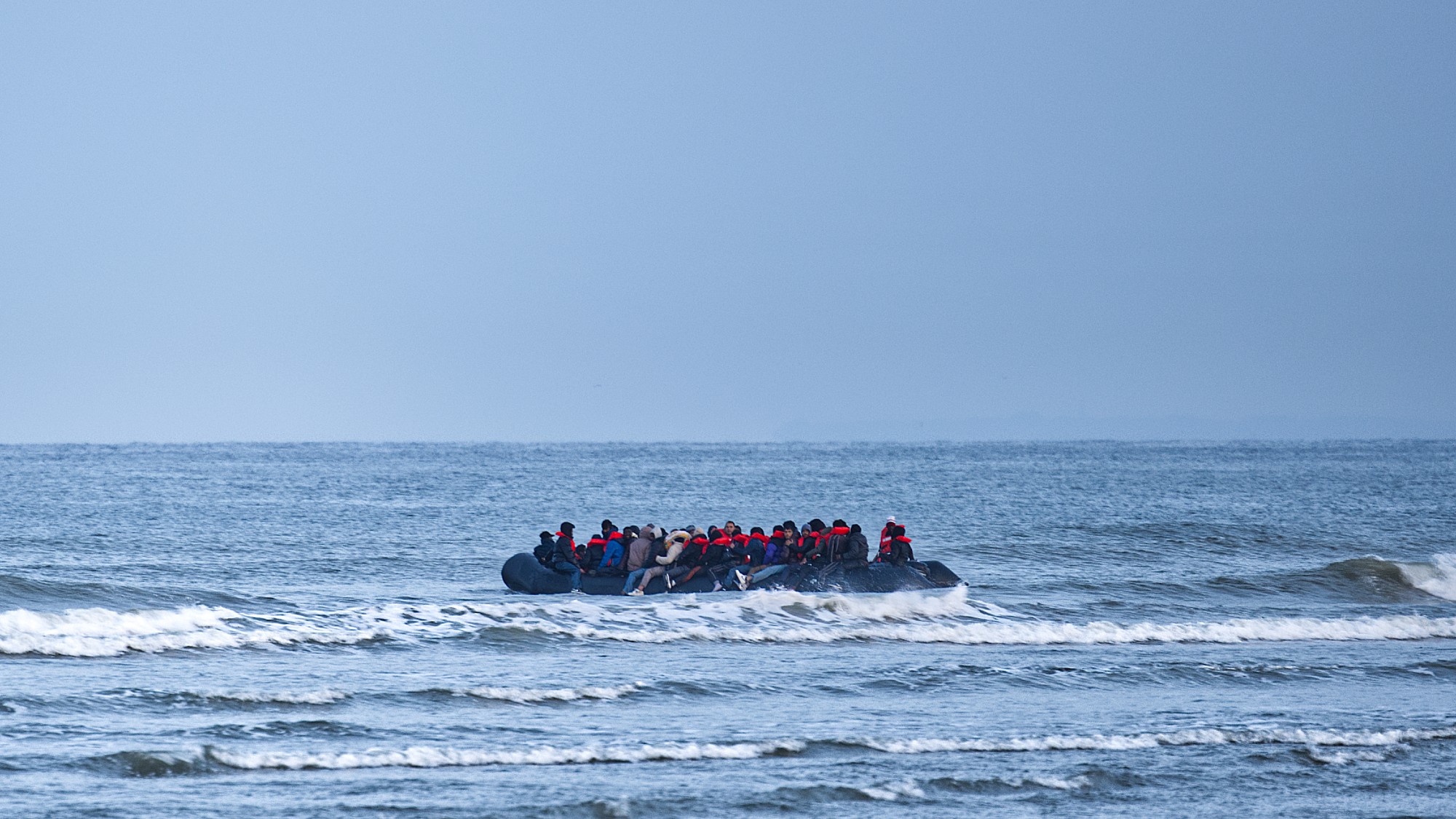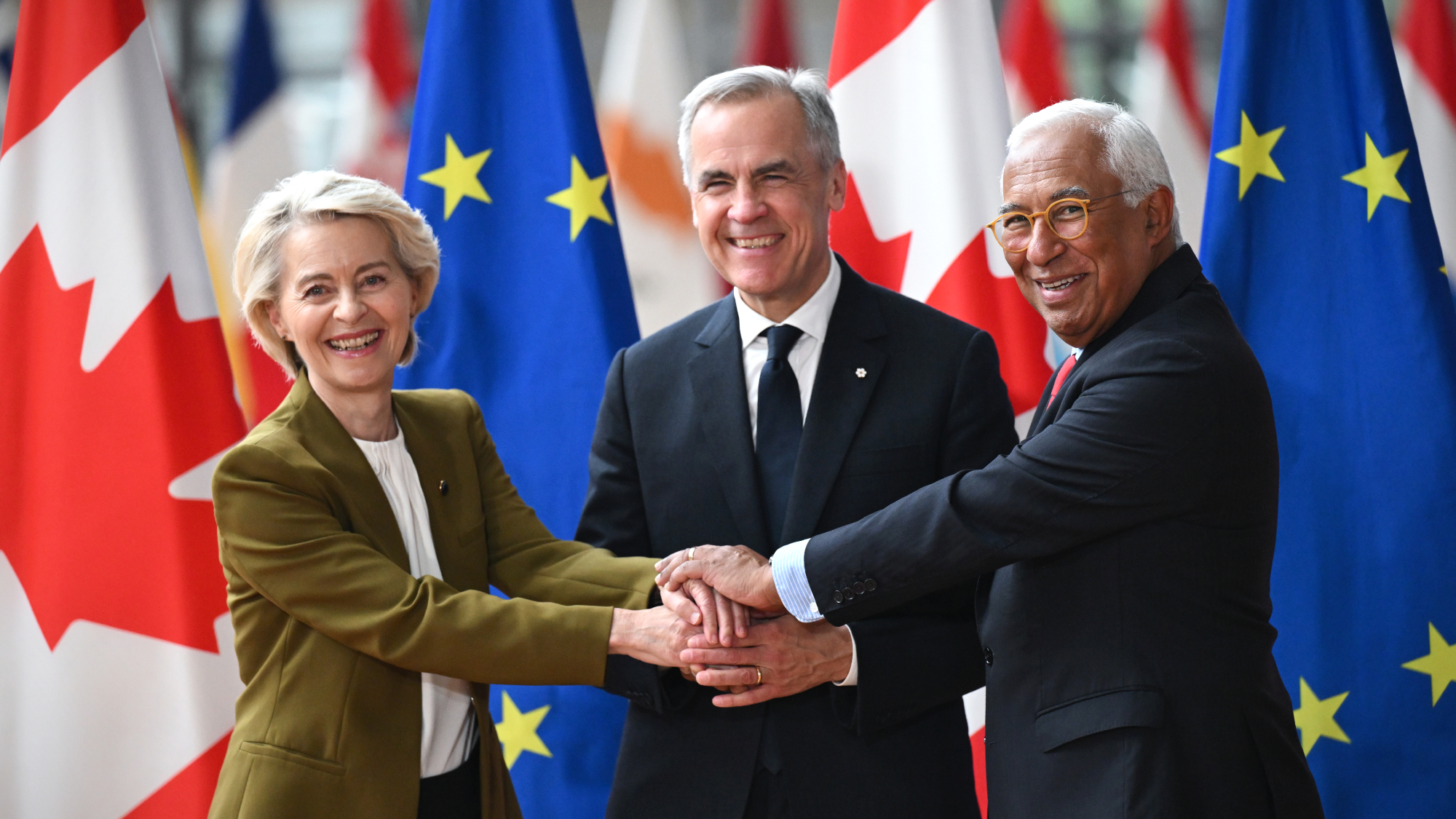What’s behind Europe’s sharp drop in illegal migration?
Fall in migrant crossings won’t head off tougher immigration clampdowns

A free daily email with the biggest news stories of the day – and the best features from TheWeek.com
You are now subscribed
Your newsletter sign-up was successful
European countries are “going to hell” because “illegal aliens are pouring in”, Donald Trump told the UN last week. But, in actual fact, the number of migrants arriving in Europe is going down – dramatically.
EU border management figures show that, in the first eight months of this year, 112,000 people crossed illegally into Europe – down 21% from last year, said The Economist. That’s “an even more impressive” 52% drop from the comparable period in 2023, and an astonishingly small number compared with 2015, when “the continent’s biggest flows of refugees since the Second World War” saw over a million people enter Europe on asylum routes.
What did the commentators say?
The figures aren’t falling because the “underlying causes of migration have changed” but because, in response to a shift in public sentiment, the EU is “experimenting with new ways” of heading migrants off, said The Economist. After the 2015 influx, the EU “put a long bet on deterrence” and, although this has looked like “a poor wager” for some years, this summer “the bet seems to have paid off”.
The Week
Escape your echo chamber. Get the facts behind the news, plus analysis from multiple perspectives.

Sign up for The Week's Free Newsletters
From our morning news briefing to a weekly Good News Newsletter, get the best of The Week delivered directly to your inbox.
From our morning news briefing to a weekly Good News Newsletter, get the best of The Week delivered directly to your inbox.
The bloc’s main strategy has been to “build a big, invisible wall far from its own borders” in countries which migrants try to pass through on their way to Europe. In return for cooperating, these “transit countries” get significant sums of aid and investment, as well as training and funds for their coastguards, border officials and police forces.
There has been a “high degree of cooperation” from Tunisian and Libyan authorities to curtail “the departure of would-be illegal migrants from their shores”, said The Arab Weekly. Significantly, there has also been a “massive drop in Syrians seeking protection” since the Assad regime fell at the end of last year.
But even as the numbers drop, “the pressure to get tough on migration has never been higher” and, for the “right-wing parties that hold sway in the European parliament”, deterrence must be accompanied by faster “returns” and tougher handling of “irregular arrivals”.
There are now “numerous well documented cases of asylum seekers being pushed back across EU borders by police and coastguards” in the bloc’s outermost member states, including Greece, Poland and Latvia, said the BBC’s special correspondent Fergal Keane. And even in Sweden, “which historically prided itself as a welcoming nation for those fleeing persecution”, conditions for permanent residency and family reunification have been tightened, and “asylum quotas have been substantially reduced”.
A free daily email with the biggest news stories of the day – and the best features from TheWeek.com
What next?
A “landmark” EU migration pact that “hardens border procedures and envisages accelerated deportations” comes into force next year, said The Arab Weekly. “But many countries felt it did not go far enough”, and further talks are expected in the months ahead, with extra “return hubs” for rejected asylum seekers a particular point of contention.
In coming years, migration numbers “may surge and fall”, said the BBC’s Keane, but the “global crises that drive migration are not going to disappear”. And that remains the “fundamental challenge“ for Europe’s politicians.
Chas Newkey-Burden has been part of The Week Digital team for more than a decade and a journalist for 25 years, starting out on the irreverent football weekly 90 Minutes, before moving to lifestyle magazines Loaded and Attitude. He was a columnist for The Big Issue and landed a world exclusive with David Beckham that became the weekly magazine’s bestselling issue. He now writes regularly for The Guardian, The Telegraph, The Independent, Metro, FourFourTwo and the i new site. He is also the author of a number of non-fiction books.
-
 Local elections 2026: where are they and who is expected to win?
Local elections 2026: where are they and who is expected to win?The Explainer Labour is braced for heavy losses and U-turn on postponing some council elections hasn’t helped the party’s prospects
-
 6 of the world’s most accessible destinations
6 of the world’s most accessible destinationsThe Week Recommends Experience all of Berlin, Singapore and Sydney
-
 How the FCC’s ‘equal time’ rule works
How the FCC’s ‘equal time’ rule worksIn the Spotlight The law is at the heart of the Colbert-CBS conflict
-
 ‘The West needs people’
‘The West needs people’Instant Opinion Opinion, comment and editorials of the day
-
 Vietnam’s ‘balancing act’ with the US, China and Europe
Vietnam’s ‘balancing act’ with the US, China and EuropeIn the Spotlight Despite decades of ‘steadily improving relations’, Hanoi is still ‘deeply suspicious’ of the US as it tries to ‘diversify’ its options
-
 Does standing up to Trump help world leaders at home?
Does standing up to Trump help world leaders at home?Today’s Big Question Mark Carney’s approval ratings have ‘soared to new highs’ following his Davos speech but other world leaders may not benefit in the same way
-
 ECHR: is Europe about to break with convention?
ECHR: is Europe about to break with convention?Today's Big Question European leaders to look at updating the 75-year-old treaty to help tackle the continent’s migrant wave
-
 Moscow cheers Trump’s new ‘America First’ strategy
Moscow cheers Trump’s new ‘America First’ strategyspeed read The president’s national security strategy seeks ‘strategic stability’ with Russia
-
 Canada joins EU’s $170B SAFE defense fund
Canada joins EU’s $170B SAFE defense fundspeed read This makes it the first non-European Union country in the Security Action for Europe (SAFE) initiative
-
 What does the fall in net migration mean for the UK?
What does the fall in net migration mean for the UK?Today’s Big Question With Labour and the Tories trying to ‘claim credit’ for lower figures, the ‘underlying picture is far less clear-cut’
-
 Defeating Russia’s shadow fleet
Defeating Russia’s shadow fleetThe Explainer A growing number of uninsured and falsely registered vessels are entering international waters, dodging EU sanctions on Moscow’s oil and gas